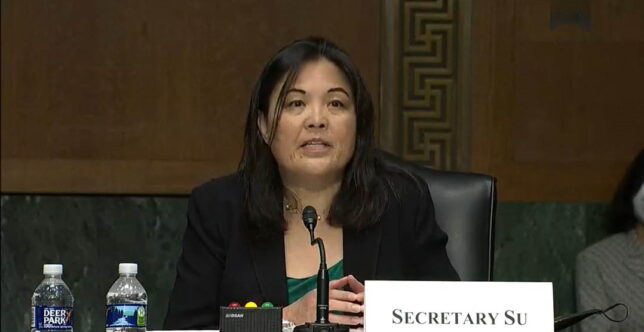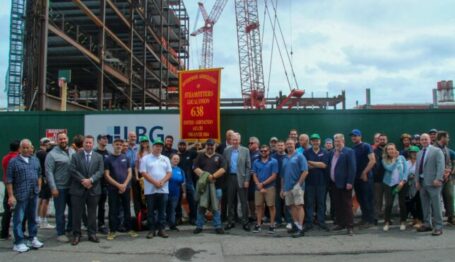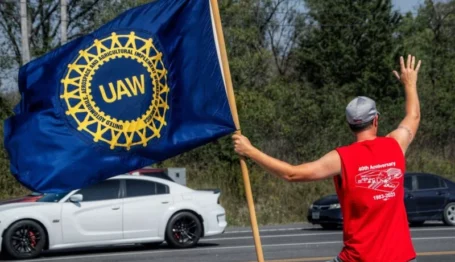Labor Watch
Meet the New Department of Labor Boss, a Practitioner of Social Justice Unionism
 Julie Su, testifying during her confirmation hearing for deputy labor secretary, March 16, 2021. Credit: C-SPAN2.
Julie Su, testifying during her confirmation hearing for deputy labor secretary, March 16, 2021. Credit: C-SPAN2.

President Joe Biden took office in 2021 vowing to reward organized labor for the support it gave him, and his administration has done its level best to deliver those rewards. It has granted ethics waivers to former labor officials in their government posts, it has withdrawn proposed rules scrutinizing the finances of union-affiliated “trusts,” and it has given teachers unions influence over school reopening procedures while issuing Justice Department threats against their critics.
But that has not stopped the long decline in union membership. And with Labor Secretary (and former Laborers union local boss) Martin Walsh departing office to become boss of the National Hockey League players’ union, the Biden administration has chosen to replace him with an aggressive, radical, and committed practitioner of social justice unionism: Deputy Secretary of Labor Julie Su.
Social Justice Unionism, Revisited
Before discussing Su, it is important to recall what “social justice unionism” is. Under social justice unionism, organized labor is not a fully independent actor pursuing the material interests of its membership or even the working class at large. Instead, it is a cog in a political and cultural machine that works towards a full-spectrum left-wing agenda, including on issues far outside what might be considered organized labor’s “economic core.”
Once one goes looking for examples of social justice unionism in practice, it is easy to find. Union officials criticizing the Supreme Court for preparing to overturn Roe v. Wade is social justice unionism. Government worker unions spending to defeat gun rights ballot measures in conservative states is social justice unionism. Campaigning alongside Planned Parenthood to require sex ed lessons starting in kindergarten is social justice unionism. Indeed, social justice unionism can even lead labor unions to oppose the material interests of members in service to the broader left-wing political and social agenda.
Su’s Critical Race Theory
So back to Labor Secretary nominee Julie Su. She is a product of the left-wing activism industry, having worked since receiving her law degree in positions either in government or for the Asian Pacific American Legal Center (APALC; now Asian Americans Advancing Justice-Los Angeles). As a college student, she engaged in left-wing activism.
She rose to prominence with APALC by campaigning against horrifying working conditions in the Los Angeles area garment industry in the mid-1990s. For her efforts, she was honored by President Bill Clinton and the MacArthur Foundation, which gave her a “genius grant” fellowship in 2001.
In 2002, she co-authored an article on her experiences titled “Critical Coalitions: Theory and Praxis” for the volume Crossroads, Directions, and a New Critical Race Theory. In the piece, she and her co-author, University of Hawaii Law School professor Eric Yamamoto, described Su’s efforts to rationalize coalition building in a racial-and-ethnicity-focused context informed by critical theory among Thai and Hispanic immigrant garment workers. The right-of-center group Americans for Tax Reform has compiled some of Su and Yamamoto’s more egregiously radical quotations (among them “should we not encourage deeper understanding of one another not only as individuals but also as members of racial communities?”), but one that ATR omits is of particular relevance to social justice unionism. Su and Yamamoto write, “We build critical coalitions not only because of the enhanced potential for favorable outcomes, but also because the process of coalition-building itself sometimes changes each of us.”
This is a sort of “tails side” of the social justice unionism “coin.” Normally, when one speaks of social justice unionism one speaks of its effects on unions as institutions and the broader left-wing movement: The unions add their (diminished) numbers and clout in exchange for protection from the rest of the coalition. But Su indicates that the process of constructing a coalition influenced by critical theory (in which a labor union might participate) also turns the constituents toward critical theory–influenced positions themselves.
This sort of coalition building appeals to the leftist activists who form the labor union movement’s staff cadres because coalition building in the Big Labor context involves securing the maximum compulsory payment of fees to unions allowable under legal precedents. And it permits the maximum coercion in organizing permissible by law and the ability of Democratic politicians to win reelection. By this method and the “political education” that they conduct, labor unions turn normal citizens into woke activists —if not woke activists of conviction at least woke conscripts. (For more on woke conscription, see Bethany Mandel and Karol Markowicz’s Stolen Youth.)
The Intersection of Big Labor and Critical Coalitions
With the concept of “woke conscription” in mind, the Biden administration’s labor policy that Su has carried out as Deputy Secretary of Labor and that she would lead as Secretary of Labor if confirmed takes on new menace. As California Labor Secretary, Su supported and began implementing AB 5, the SEIU- and California Labor Federation-backed restriction against independent contracting, which has led to pushback even in the dark-blue state.
On the federal level, the California law’s restrictions on contracting have been transposed into the PRO Act, a federal union-strengthening bill the Biden administration has supported and which almost all Democrats in the previous House of Representatives voted for, including every Democratic then-Representative endorsed by the U.S. Chamber of Commerce. Support for Su is tantamount to support for the whole slew of labor union-backed California labor policies, potentially including sectoral bargaining, another manner of recruiting unwilling woke conscripts for the radical-left’s critical-theory coalition.
Independent contracting and the franchise model of small business ownership, also targeted by the SEIU to ease union organizing and threatened by the Biden administration, are key rungs on the ladder for new prospective members of the petite bourgeoisie that constitutes an important constituency of the full-spectrum right. Kicking the lower rungs off the ladder to the petite bourgeoisie, in the logic of Su’s “critical coalitions,” strengthens the critical race theory-aligned left faction by keeping would-be small entrepreneurs down and in positions where they can be conscripted into a woke coalition by organization into labor unions and through compulsory labor union fees where those are permitted.
Power and the Specter of Lockdown
There is more to dislike about how Su and the Biden administration conducted their first two years. The Department of Labor, through the Occupational Safety and Health Administration, enacted emergency temporary standard regulations governing mask mandates and social distancing in health care settings and, more infamously, mandating vaccination or testing for COVID-19.
Organized labor pushed to continue mask mandates and invasive workplace COVID-case recordkeeping nationwide through OSHA action, and it even sued to preserve these specters of lockdown as vaccines were coming on-line. And once they did, labor union–aligned front organizations like Jobs With Justice briefed the Supreme Court supporting upholding OSHA’s nationwide vaccine mandate. (Mercifully, the Supreme Court struck it down except as it applied to health care settings.)
As the COVID pandemic recedes into the background with the pandemic emergency scheduled by the Biden administration to end on May 11, 2023, these acts do not suddenly become irrelevant. They demonstrate that the Biden administration’s Labor Department in which Su has worked and that she is appointed to lead intends to press the full-spectrum agenda of the organized labor movement and the Left—enrolling woke conscripts into social justice unionism. Even if the specter of lockdown passes, the specter of regulations that serve only the institutional Left remains untouched.
Conclusion
Martin Walsh’s Department of Labor favored labor unions, as one would expect given Walsh’s affiliations with organized labor and the Biden administration and organized labor’s mutual support for one another. But a Labor Department led by Julie Su would be something even more radical: a Labor Department driven by a career ideologue with a history of theorizing and practicing left-wing coalition building. A Labor Department led by Su with a mandate from President Biden to implement as much of the PRO Act as is possible without the consent of the House of Representatives (or the Senate) would see potential woke conscripts throughout the American workforce and would see many opportunities to saw off the lowest rungs of the bourgeois ladder that replenishes leftism’s opposition.
Regulatory actions targeting independent contracting and franchised businesses would harm American entrepreneurialism and individualism that both organized labor and the race, gender, and sexuality-essentialist social-liberal “woke” left find troublesome. To those opposed to the economic or the social arm of the Left’s present-day incarnation, the prospect of an ideologue at Labor is deeply concerning.



